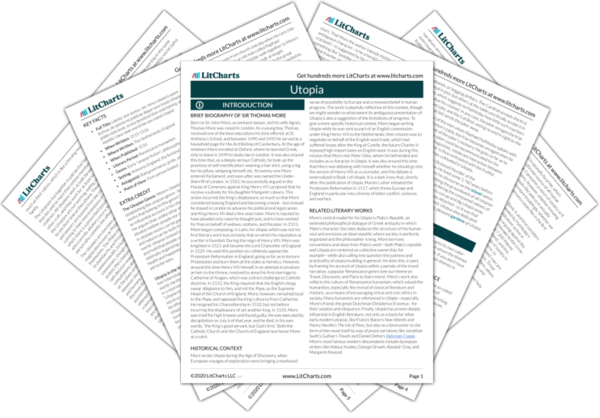Travel, Discovery, and Place
Thomas More wrote his Utopia during the so-called Age of Discovery, when European voyages of exploration, especially by sea, were vastly enriching human knowledge about the globe. With discovery, moreover, came a renewed belief in human progress and perfectibility—both ideas that More muses upon in his work.
Utopia is at once a parody of the then-popular genre of the travel narrative—written by explorers about their exciting adventures abroad—and also a vision of a society organized…
read analysis of Travel, Discovery, and PlaceBad Governance, Pride, and Idleness
Utopia is divided into two books. The first (composed for the most part after the second) contains a discussion of governance in Europe generally and specifically in England under King Henry VIII, whom Thomas More the man famously served as a counselor and at whose hand More was later executed for treason. Book II contains the description of Utopia’s government, laws, and orders. (Following the influential Utopia scholar J.H. Hexter, we occasionally refer to Book…
read analysis of Bad Governance, Pride, and IdlenessProperty, Labor, and Utopian Society
In Book II of Utopia, we learn that the principal foundation of Utopian law and policy, as in Plato’s ideal republic and some monastic systems, is the abolition of all private property. In other words, the citizens of Utopia own nothing individually but share the resources of their nation collectively, from land to housing to bread and wine. (The Utopians are so committed to this that, to give a more radical example, the doors…
read analysis of Property, Labor, and Utopian Society
The Public Good, Virtue, and Religion
As a character in Utopia (not to be confused with the historical figure and author), Thomas More questions Hythloday as to whether or not people will really work at all without the incentive of personal gain (referring to Utopia’s lack of private property). Won’t people be too confident in other people’s industry and so lazily excuse themselves from labor? In response, Hythloday explains how many important features of Utopian society are designed precisely so that…
read analysis of The Public Good, Virtue, and ReligionIdeals and Practicality
There is a tension throughout Utopia between our ideals and practicality, between wish and reality. Indeed, after listening patiently to Hythloday’s description of Utopia, that ideal society, Thomas More the character confesses that, though he wishes for many features of Utopia to be realized in Europe’s cities, he doesn’t dare hope as much, for such a hope would be unrealistic.
More the character, for his part, is nonetheless somewhat optimistic, at least in Book…
read analysis of Ideals and PracticalityThe Ambiguities of Utopia
Utopia is so ambiguous a work that one critic calls it “the most slippery of texts: in no other literary work is the question of authorial intention at once more pressing or more unanswerable.” As such, we can’t take at face value anything we read in the book. Questions the text invites but never resolves include: can a utopia be established on earth, and, if not, why imagine one, especially when philosophy falls on deaf…
read analysis of The Ambiguities of Utopia






